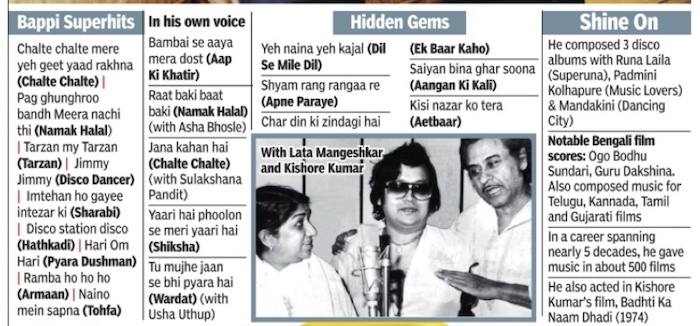Bappi Lahiri
This is a collection of articles archived for the excellence of their content. Additional information may please be sent as messages to the Facebook community, Indpaedia.com. All information used will be gratefully acknowledged in your name.
This is a collection of articles archived for the excellence of their content. |
A brief biography
Avijit Ghosh, February 17, 2022: The Times of India
Music director Bappi Lahiri harnessed and harvested the “disco sound” to produce chartbusters in films like Disco Dancer and Namak Halaal but was equally adept in composing gentler semi-classical and folksy tunes best exemplified in the less-remembered songs of Aangan Ki Kali, Apne Paraye and Aetbaar.
The composer-singer had been under treatment for several weeks. “He was suffering from OSA (obstructive sleep apnea) and recurrent chest infection…He succumbed to his illness at about 11. 45pm,” Dr Deepak Namjoshi of Mumbai's CritiCare Asia Hospitals said in a statement. In the 1980s, a disco track became mandatory in Hindi films after the tsunami-like success of Qurbani’s ‘Aap jaisa koi’ (singer: Nazia Hasan, composer: Biddu). Songs became something that you both danced and listened to. For the young and the restless, beat acquired more prominence. And the electronic synthesizer became the busiest instrument. No Bollywood composer understood, captured and expressed the new musical ecosystem like Bappi.
His dalliance with disco started with ‘Hari Om Hari’ (Pyara Dushman, inspired by Neil Sedaka/Eruption’s One Way Ticket) and ‘Rambha ho ho ho’ (Armaan). Director B Subhash’s Disco Dancer became his high noon. From the title track to ‘Jimmy Jimmy’, every track in Disco Dancer was dancey and delicious. If ‘Awara hoon’ was Hindi cinema’s major cultural export in the 1950s, ‘Jimmy Jimmy’ remains a musical ambassador even in Vladimir Putin’s Russia today. Just go to YouTube for confirmation.
Contributions
Avijit Ghosh, February 17, 2022: The Times of India
Bappi Lahiri’s breathless foottappers and Indeevar’s nursery-rhyme lyrics (’Char baar marenge ek baar ginenge’, Mawaali) in Southern productions defined popular film music in the 80’s. They were integral to mind-numbing entertainers whose plots could match Donald Trump’s statements for incredulousness. Jeetendra’s Himmatwala, Mawaali, Maqsad and Tohfa were all propelled by these tunes. “He was a king in Madras,” director B Subhash told this reporter some years ago.
In the 1980s, Bappi da, as many called him fondly, provided the score for an eyepopping 230 films. In 1985, he gave music to 33 movies: 30 Hindi, 2 Bengali, 1 Tamil; which means a film released every 12 days! The composer lorded over the charts even when some of the songs were copies of foreign hits and desi classics. There was an alternative side to him as well. In Basu Chatterjee’s Apne Paraye, he surprised critics with his folksy tunes. ‘Shyam rang rangaa re’, where he employed the Bengal percussion instrument khol, has the meditative feel of a Chaitanya kirtan. ‘Gao mere mann’ carries the smell of ponds, banana leaves and 19th century Bengal. Not many would associate him with songs such as ‘Saiyan bina ghar soona’ (Aangan Ki Kali), ‘Chaar din ki zindagi hai’ (Ek Baar Kaho) or ‘Kisi nazar ko tera’ (Aetbaar). Many of them were sung by Yesudas and Bhupendra.
Born in north Bengal’s Jalpaiguri town to musician parents, Alokesh (his original name) trained under guru Samta Prasad and was hailed as a tabla prodigy at just six. Nanha Shikari (1973) was his debut Hindi film. But the composer made a distinct impression with Chalte Chalte (1976), among his finest scores.
Amit Khanna, who wrote Bappi got the film. “The film director Bhisham Kohli, also Dev Anand’s nephew, was looking for a music director. He was unable to get RD and L-P. Bappi had earlier come to Navketan looking for work. And I was impressed by some of the tunes I heard. I told Bhisham, why don’t you try him? During the music session, Bappi played the ‘Chalte Chalte’ tune. I wrote the opening lines. And this led to the song,” recalled Khanna. Slowly, he worked his way up with hummable melodies in low budget action films such as Zakhmee, Ravikant Nagaich’s Surakksha and Wardat and the Ramsay brothers’ horror yarns (Saboot). Disco Dancer elevated his career.
But when Prakash Mehra, then Bollywood’s along with Manentered the super league. The music in Namak Halaal and Sharaabi (both Big B films) were worth the weight of the gold chains he fondly wore. Namak Halaal’s ‘Pagh ghungroo baandh’ was nearly 12 minutes long but the tune was riveting. ‘Raat baaki’, which he sang with Asha, is a standout. Sharaabi earned him his lone Filmfare award in 1985.
He tasted success in the 1990s too: K C Bokadia’s Aaj Ka Arjun and David Dhawan’s Aankhen, to name just two. ‘Gori hai kalaiyan’ (Aaj Ka Arjun) topped the Binaca Geetmala in 1990. In recent years, Bappi sang in Baaghi 3 and Shubh Mangal Zyada Saavdhan. Last April, he had contracted Covid but recovered well. Now, the amiable and ever-smiling composer is no more. But the best of his 80s tracks remain groovy as ever. And even today, there’s no better farewell song than ‘Chalte Chalte’.
